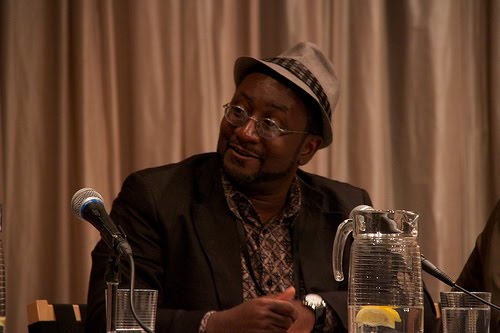Q: I haven't had time to write, when I do write I have been re-writing some old stories. But now my head seems empty. How do I get charged up again? Mr. M.
A: Hey, Mr. M. It is always good to hear from you. Oh, a little bit of the old writer's block, eh? Groan. Well, first of all, you know that I do not believe in writer's block. Somewhere on the internet is an essay I wrote about that topic a few years ago.
Nevertheless, Here are some things you can do:
1) Work on something else, entirely. Then when you feel the juice, come back to the old thing you are blocked on.
2) Read. When I get up early in the morning and I am just not able to look at the saaaaaame manuscript again, I read. I read my old work. I read someone else's work. I read a novel I've been meaning to get to. I proofread . . . away from the computer . . . with pen or pen. I read the dictionary. I read the newspaper or aol blurbs. Sometimes I end up reading for three or four weeks straight, until I feel the juice. See, I get up at 4 or 5 every morning to write--but write does not always mean "write." Reading is an essential part of the writing process.
3) Write. Write a list. Write several lists. I love lists. I write a list of things that smell. Things that taste peculiar. Things that sound creepy. Things that sound like a car engine. A wish list for my dying friend. A list of ten things I never want anyone to find out about me. Things that feel like a woman's breasts (40-Year Old Vigin) . . . list of interesting verbs . . . believe me when I say that these lists often turn into ideas for stories or that they help to layer the stories I am working on. For example, in a scene I was working on a couple of months ago, that list of "ten things I never want anyone to find out about me" became a crucial element in a plot.
4) Interview your characters. I creat a list of interview questions and then I pick a minor character, usually, and interview him/her. These inteviews almost never show up in the fiction, but they are great at helping me get to the heart of what makes my people tick.
5) Specific edits--go back into the story and question each adverb--do I need it or not? Question each adjective--do I need it or not? Each "and"--do I need it or not? Each dash--do I need it or not?
6) If I absolutely must get the thing done, I muscle it out. I pick up that pen (figuratively speaking, since I actually write on the computer), and I write. I write my way through the writer's block.
This is my usual method, since I do not really believe in writer's block. I write.
I do not care of I write brilliant stuff or crap--I set myself a page limit goal, and then I go for it.
Sometimes I write stuff like "I am so blocked right now that this car chase scene looks just like any other car chase scene I have ever written, and it has gotten me to wondering why I have so many car chase scenes in my stories. This is not film, this is prose fiction, but I have been watching so many movies that it is affecting my writing. I am no longer experiencing the world--I am viewing the world through a director's eyes--I am becoming cliched in the way I see the world--just like Thomaso, roaring down the I-4 after his wife and her lover in the Camaro he borrowed from the pimple-faced teen next door. Now he realizes that borrowing the car from that kid was a dumb move. The kid is gonna know why he borrowed it, to follow his wife. The kid is gonna tell his mother, Mildred "ears and mouth" Gomez. Mildred Gomez is gonna tell everbody else. The ear and mouth tell all . . ." and like that I come out of the block.
Once we free ourselves to begin writing honestly, and not forcing ourselves to be brilliant, the block goes away. Our muse is attracted to honesty, not our pomposity. She comes when we are being true to our pen.
Hemingway, I have heard, had this technique--he would begin by writing one true thing on the page--one single true sentence. "I hate my mother." "Blue is a common color for hats." "The sun also rises." And then he would ponder this true sentence whatever it was, and it would beckon the muse.
Be honest. Do not become full of self. Do not see yourself as a great writer. See yourself as an honest man telling his story honestly. The block, which never existed anyhow, will go away.
Keep writing because that is what a writer does. A writer writes.
Thanks for you email, Mr. M.
Preston

2 comments:
Thanks for the great advice!
preach brother allen
Post a Comment